- Sep 22, 2013
- 4,956
- 250
- 85
How has the age of technology/machinery changed the way we think about psychosomatic imagination?
What is the modern appeal of films like Ghost in the Machine [1993], The Terminator [1984], and The Fifth Element [1997]?
====
Carnage (Marvel Comics) is a folk-avatar symbolizing the anarchy of complete loss of morality as well as body control. Carnage was a convict named Cletus Kasady who was mutated into a flesh-morphing violence-master when he was 'merged' with a strange virulent alien 'substance' (called the Symbiote), rendering him as an 'anarchy messenger.' Carnage can make weapons on-the-fly and has no respect for medicine, teamwork, or physical health. He is a 'new age Frankenstein' and represents complete loss of care of physical well-being or even moral health. Carnage therefore is what laymen refer to as an 'abomination.'
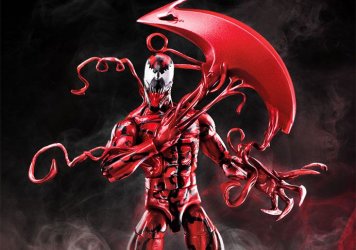
The Xenomorph is the fictional iconic terrifying predatory creature presented in the popular Alien science-fiction horror films, including Alien 3, Alien: Resurrection, and Alien:Covenant. The Xemomorph is a semi-insectisoid semi-dragon like creature who possesses highly-corrosive acidic blood (making it very dangerous to puncture it from close-range), an eerie agility-enhancing(!) snake-like tail, a strange oblong head with a metal jaw and metallic teeth, and razor-sharp claws. The Xenomorph is incredibly swift and relentless when hunting humans! The Xenomorph is a post-modern Godzilla, symbolizing new age fears regarding surviving past our 'adolescent age' of technology-inception (e.g., the fear of becoming too savage because of a dependency on machinery and weapons). The Xenomorph is therefore a 'devastation' oriented science-fiction (and hence modern!) 'monster.'
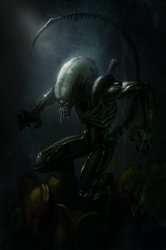
Electro (Marvel Comics) is also a folk-avatar symbolizing modernization angst. Electro is a mutant human who has the uncanny ability to control or even manipulate electric energy, electricity-fields, and electric shocks. Electro can zap you or use the lifting force of magnetism surrounding electric sparks (electromagnetism) to make his electric bolts deadly 'ropes' (enabling him to lift and hurl cars from the street towards his adversaries!). Electro therefore uses electricity however he wishes and is a kind of 'warlock' (manipulating an element of nature --- electricity --- to his own advantage!). Electro reminds us of the modern fear of misusing natural elements, resources (e.g., fossil fuels), and energy itself as we 'expand' our great boundaries of civilization (e.g., Facebook, NASDAQ, etc.). Electro is therefore considered an 'omen-figure.'
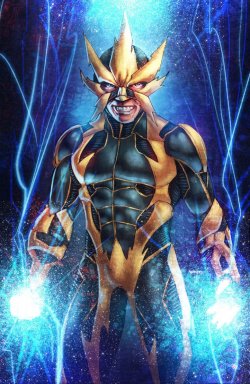
This focus on various avatars/monsters such as Electro and the Xenomorph certainly indicates a modern interest in the 'tactile' philosophies associated with the use and control of elements and our body itself. By modern, I refer to anything after Industrialization and therefore the 'inception' of the Information Age and the mass use of computers and the storytelling of 'virtual reality' environments. The modern world is filled with gadgets and toys that enable us to 'interface' with the 'social network' (e.g., Facebook). The modern world therefore reveals our enduring human curiosity about the 'experience' of engaging with the forces of psychosomatic pleasure, convenience, or even learning! There must be a connection then between psychosomatic ideals and dreams (or imagination).

Since the modern world sees a great deal of traffic and commerce (e.g., Wall Street, NASDAQ, eTrade, Amazon.com, etc., etc.), human beings are much more self-conscious about the impact of technology on our physical bodies and the experience of imagining virtual worlds and cyber-connected information-highways. Perhaps our colloquial conceptions of 'yoga' (physical meditation) have even changed. How have we progressed from Leonardo da Vinci's Renaissance-Era Vitruvian Man (a characterization of the muscular elegance of body-fitness and posture)? Does our modern sci-fi storytelling about the creation/invention of cyborgs (semi-organic, semi-machine humanoids) affect our consciousness regarding 'breathing and circulation' and hence pleasure and pain?
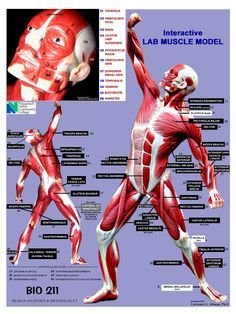
Since modern technologies offer all kinds of wizardry-experiences involving 'interacting' with a cyber-matrix (e.g., touch-screen Internet information/imagery access), the way we conceive of convenience and stimulation is drastically changing. We think of laser-surgery, automated driving, and self-regulating energy-conserving room-heaters as 'integral' to our modern daily life(!). Why then do we make psychophysical-devastation themed sci-fi horror films such as Jason X (a movie about a zombie-psychopath preying on humans in outer-space with horrifying weapons)? It seems our sense of perception as contrasted with imagination has become more doom-oriented. This must be because our intensive interaction with inorganic lifeless machinery has made us more conscious of mortality and synthetic enhancements (and hence lifespan-philosophies).
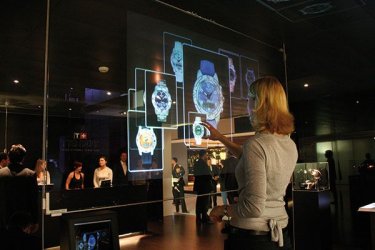
What would Hobbes (political philosopher) and Asimov (science-fiction philosopher) say about this 'shift' in human psychophysics?
HOBBES: Urban traffic (work-commutes, etc.) sensitizes humans to labor.
ASIMOV: So convenience itself has become a 'parameter.'
HOBBES: That is the net result of mass tech-mobilization.
ASIMOV: There should therefore be a 'primalism' backlash.
HOBBES: Well, Americans are making many movies about forest-adventures.
ASIMOV: Yes, such as the Hobbit series.
HOBBES: Americans have also made many horror-films and comics-films in the modern era.
ASIMOV: Perhaps pedestrian prose regarding shock and customs has changed.
HOBBES: It seems that network-conveniences such as Netflix and Facebook prompt 'yoga'!
ASIMOV: Imaginations about soaring in spaceships makes us more conscious of mortality.
HOBBES: We are therefore more sensitive about the 'visceral experience' of toys.
ASIMOV: Toys signify an interaction between imagination and social consciousness.
HOBBES: Yes, war-toys are sometimes considered controversial and symbolic of mischief.
ASIMOV: Perhaps sci-fi horror films such as Alien: Covenant and Leviathan symbolize doom.
HOBBES: Modern man is much more 'conscious' of pain despite such tech-fantasies!
ASIMOV: There is a mental need to indulge in imaginations about 'transformation.'
====


What is the modern appeal of films like Ghost in the Machine [1993], The Terminator [1984], and The Fifth Element [1997]?
====
Carnage (Marvel Comics) is a folk-avatar symbolizing the anarchy of complete loss of morality as well as body control. Carnage was a convict named Cletus Kasady who was mutated into a flesh-morphing violence-master when he was 'merged' with a strange virulent alien 'substance' (called the Symbiote), rendering him as an 'anarchy messenger.' Carnage can make weapons on-the-fly and has no respect for medicine, teamwork, or physical health. He is a 'new age Frankenstein' and represents complete loss of care of physical well-being or even moral health. Carnage therefore is what laymen refer to as an 'abomination.'

The Xenomorph is the fictional iconic terrifying predatory creature presented in the popular Alien science-fiction horror films, including Alien 3, Alien: Resurrection, and Alien:Covenant. The Xemomorph is a semi-insectisoid semi-dragon like creature who possesses highly-corrosive acidic blood (making it very dangerous to puncture it from close-range), an eerie agility-enhancing(!) snake-like tail, a strange oblong head with a metal jaw and metallic teeth, and razor-sharp claws. The Xenomorph is incredibly swift and relentless when hunting humans! The Xenomorph is a post-modern Godzilla, symbolizing new age fears regarding surviving past our 'adolescent age' of technology-inception (e.g., the fear of becoming too savage because of a dependency on machinery and weapons). The Xenomorph is therefore a 'devastation' oriented science-fiction (and hence modern!) 'monster.'

Electro (Marvel Comics) is also a folk-avatar symbolizing modernization angst. Electro is a mutant human who has the uncanny ability to control or even manipulate electric energy, electricity-fields, and electric shocks. Electro can zap you or use the lifting force of magnetism surrounding electric sparks (electromagnetism) to make his electric bolts deadly 'ropes' (enabling him to lift and hurl cars from the street towards his adversaries!). Electro therefore uses electricity however he wishes and is a kind of 'warlock' (manipulating an element of nature --- electricity --- to his own advantage!). Electro reminds us of the modern fear of misusing natural elements, resources (e.g., fossil fuels), and energy itself as we 'expand' our great boundaries of civilization (e.g., Facebook, NASDAQ, etc.). Electro is therefore considered an 'omen-figure.'

This focus on various avatars/monsters such as Electro and the Xenomorph certainly indicates a modern interest in the 'tactile' philosophies associated with the use and control of elements and our body itself. By modern, I refer to anything after Industrialization and therefore the 'inception' of the Information Age and the mass use of computers and the storytelling of 'virtual reality' environments. The modern world is filled with gadgets and toys that enable us to 'interface' with the 'social network' (e.g., Facebook). The modern world therefore reveals our enduring human curiosity about the 'experience' of engaging with the forces of psychosomatic pleasure, convenience, or even learning! There must be a connection then between psychosomatic ideals and dreams (or imagination).

Since the modern world sees a great deal of traffic and commerce (e.g., Wall Street, NASDAQ, eTrade, Amazon.com, etc., etc.), human beings are much more self-conscious about the impact of technology on our physical bodies and the experience of imagining virtual worlds and cyber-connected information-highways. Perhaps our colloquial conceptions of 'yoga' (physical meditation) have even changed. How have we progressed from Leonardo da Vinci's Renaissance-Era Vitruvian Man (a characterization of the muscular elegance of body-fitness and posture)? Does our modern sci-fi storytelling about the creation/invention of cyborgs (semi-organic, semi-machine humanoids) affect our consciousness regarding 'breathing and circulation' and hence pleasure and pain?

Since modern technologies offer all kinds of wizardry-experiences involving 'interacting' with a cyber-matrix (e.g., touch-screen Internet information/imagery access), the way we conceive of convenience and stimulation is drastically changing. We think of laser-surgery, automated driving, and self-regulating energy-conserving room-heaters as 'integral' to our modern daily life(!). Why then do we make psychophysical-devastation themed sci-fi horror films such as Jason X (a movie about a zombie-psychopath preying on humans in outer-space with horrifying weapons)? It seems our sense of perception as contrasted with imagination has become more doom-oriented. This must be because our intensive interaction with inorganic lifeless machinery has made us more conscious of mortality and synthetic enhancements (and hence lifespan-philosophies).

What would Hobbes (political philosopher) and Asimov (science-fiction philosopher) say about this 'shift' in human psychophysics?
HOBBES: Urban traffic (work-commutes, etc.) sensitizes humans to labor.
ASIMOV: So convenience itself has become a 'parameter.'
HOBBES: That is the net result of mass tech-mobilization.
ASIMOV: There should therefore be a 'primalism' backlash.
HOBBES: Well, Americans are making many movies about forest-adventures.
ASIMOV: Yes, such as the Hobbit series.
HOBBES: Americans have also made many horror-films and comics-films in the modern era.
ASIMOV: Perhaps pedestrian prose regarding shock and customs has changed.
HOBBES: It seems that network-conveniences such as Netflix and Facebook prompt 'yoga'!
ASIMOV: Imaginations about soaring in spaceships makes us more conscious of mortality.
HOBBES: We are therefore more sensitive about the 'visceral experience' of toys.
ASIMOV: Toys signify an interaction between imagination and social consciousness.
HOBBES: Yes, war-toys are sometimes considered controversial and symbolic of mischief.
ASIMOV: Perhaps sci-fi horror films such as Alien: Covenant and Leviathan symbolize doom.
HOBBES: Modern man is much more 'conscious' of pain despite such tech-fantasies!
ASIMOV: There is a mental need to indulge in imaginations about 'transformation.'
====

